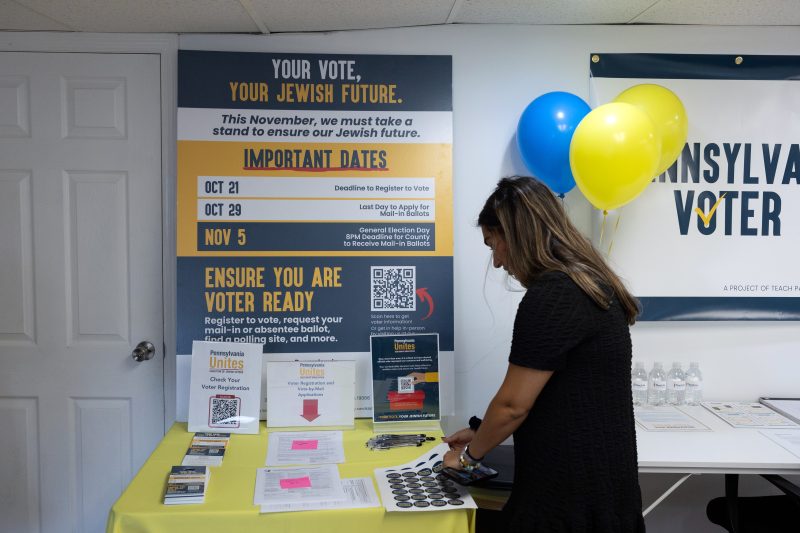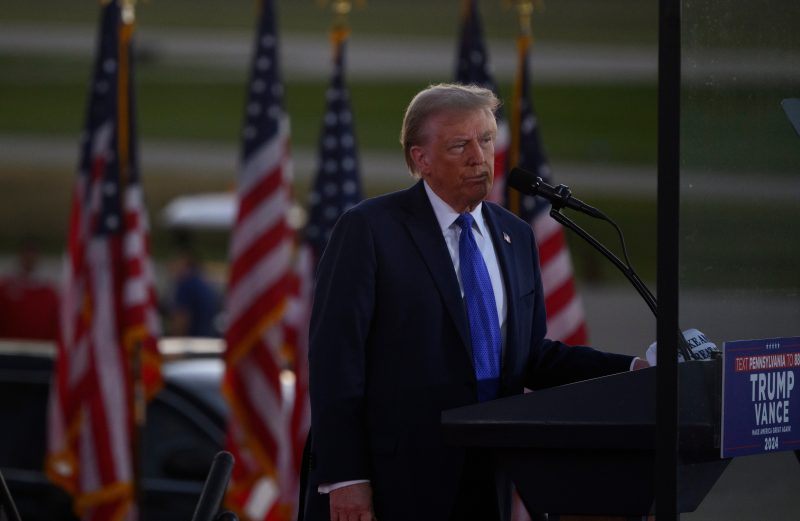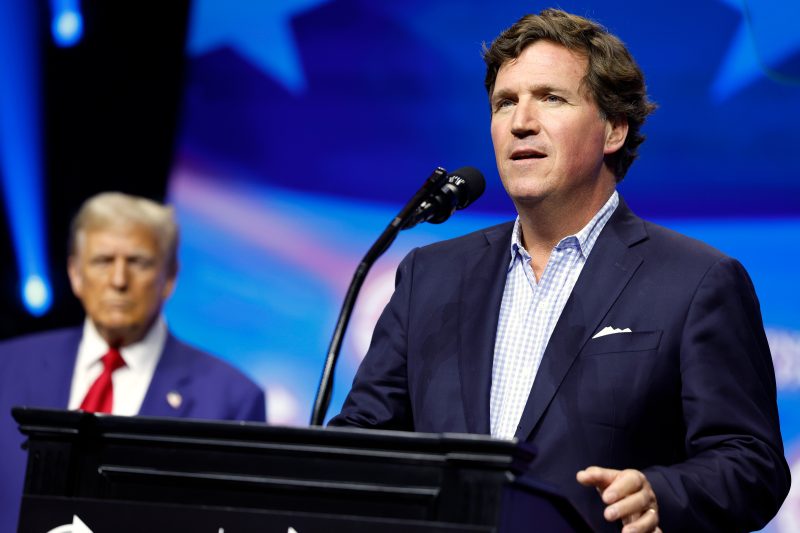Harris and Trump vie for Jewish voters unsettled by Israel-Gaza conflict

MERION STATION, Pa. — In a concession that the ongoing Israel-Hamas war and historic levels of antisemitism have some members of a core constituency newly in play, the Harris-Walz campaign and Jewish groups supporting it are more emphatically than before pressing Jewish voters to return to the Democratic fold in November.
They’re pointing to Vice President Kamala Harris’ Jewish husband, Doug Emhoff; her role in crafting a national strategy to counter antisemitism and her work to pass billions in security funding for Israel. They’re amplifying past comments by former president Donald Trump that were disparaged as antisemitic by many Jews.
Jewish Americans still overwhelmingly prefer Harris, polls show, but surveys also suggest some softening this year compared with 2020. Experts say the post-Oct. 7, 2023, climate scrambled some Jews’ sense of political identity. There are also more undecided and politically independent Jewish voters, say some Jewish Democratic leaders.
“People aren’t saying: ‘I never will vote for Democrats,’” Michael Schwartz, who oversees Pennsylvania volunteers for the Jewish Democratic Council of America. “It’s more, ‘You need to convince me, because some trust has been lost.’ This is a small trend, but it’s out there. The question is how big it is.”
The fight for voters is particularly evident in Pennsylvania. Its population of up to 400,000 Jews is the largest of any contested state and more than four times the margin President Joe Biden and Harris won by in 2020.
“Even four years ago I don’t remember the Jewish outreach machine being what it is now — that’s the result of this moment for American Jews,” said Schwartz, who has for months been running weekly phone banks to reach non-Republican Jewish voters. “You are seeing more passion since Oct. 7, [2023]. I think people are in this moment where, if you’re all in for Kamala or more skeptical, people want to have these conversations.”
Republicans and some other advocacy groups have mounted a giant effort of their own to attract Jewish voters newly unmoored from the Democratic Party, particularly liberal Jews who have been jarred by the ferocity of the past year’s anti-Israel protests, some of which tipped into antisemitism.
They are using specially developed apps that record which Jewish friends are registered to vote. Surrogates have been trained to raise campaign issues after synagogue. Stand-alone Jewish outreach offices have opened for the first time.
Nationally, outbreaks of antisemitism have led some Jewish voters to fear for their safety, a circumstance that can be persuasive in changing voter behavior. A survey published this month by NORC at the University of Chicago found 61 percent of American Jews say they feel less safe as Jews since Oct. 7, 2023, when Hamas launched an assault on Israel that prompted a counterattack by Israel in Gaza.
Pennsylvania’s two biggest cities — Philadelphia and Pittsburgh — have been rocked by events in recent years that, however different, made many Jews feel targeted.
In 2018, a white supremacist murdered 11 people at the Tree of Life synagogue in Pittsburgh, the deadliest attack on Jews in U.S. history. Last year, anti-Israel protests at the University of Pennsylvania in Philadelphia became heated. Its president, Liz Magill, was forced to resign after blowback to her congressional testimony that calls for the genocide of Jews may be acceptable under the school’s code of conduct, depending on context.
These days, the changing alliances can be seen in the contested suburbs of Philadelphia, including in heavily Jewish neighborhoods where some locals say it’s new to see a smattering of Trump signs.
As with all very small groups, solid polling on how American Jews plan to vote is sparse. A Pew Research poll this summer — before the Trump-Harris debate — found 65 percent of U.S. Jews were leaning toward Harris, and 34 percent toward Trump. Pew estimated that in 2020, Jewish voters supported Biden over Trump by 70 percent to 27 percent.
According to the NORC poll, 43 percent of U.S. Jews said antisemitism would impact how they vote this fall. Of that group, 17 percent said they normally vote Democrat but would vote Republican. Nine percent said they normally vote GOP but will be voting Democrat.
Orthodox Jews, who make up about a tenth of the U.S. Jewish population, strongly prefer the Republican Party — by a 3-1 margin, Pew found. A national group of Orthodox Jews dedicated to securing funding for Jewish institutions opened a get-out-the-vote office in September at a busy intersection in Merion Station, part of a heavily Jewish area northwest of Philadelphia.
The nonpartisan group, called Teach Coalition, is a project of the Orthodox Union — the country’s main advocacy and lobbying group for Orthodox Jews. Its app helps people identify nonregistered friends in their contact lists and designates synagogue captains to persuade Jewish voters to cast ballots, many of which will probably go to GOP candidates.
“Every [synagogue] has a sign about Israel. And Israeli flags hanging from windows — no one used to do that,” Yitz Levi, 40, a sales manager with six children who lives in Montgomery County, says of the area. “In 2020 you saw zero Trump signs in my neighborhood hood and now you see a lot.”
On a recent Tuesday, Levi was among a few dozen people milling around the ribbon-cutting of the new Pennsylvania Unites Voter Center run by Teach Coalition. The group’s political director, Dan Mitzner, said the group is spending millions this year, about 10 times what it spent in 2020.
Kush Desai, a Trump campaign spokesman for the state, said there’s a bigger focus on Jewish voters this year, “given what’s been in the news” meaning issues involving criticism of Israel and antisemitism.
Desai reiterated the former president’s emphatic support for Israel. Harris is “trying to play both sides,” he said, by meeting with members of the Uncommitted movement, who oppose military funding to Israel, while asserting she is a friend to the state.
Trump’s Jewish supporters see him as a devoted protector. Their reasons vary, but include his administration’s role in bringing about the Abraham Accords, which normalized relations between Israel and some Arab Gulf states. Some approve of his moving the U.S. Embassy from Tel Aviv to contested Jerusalem.
Trump’s campaign has played up liberal protests that included slogans such as “globalize the intifada” — a term Palestinians characterize as uprising but also denotes periods of Palestinian suicide bombings and civilians targeted in Israel.
Itamar Rosensweig, 35, who lives outside Philadelphia and teaches Jewish law and philosophy at Yeshiva University in New York City, illustrates the challenge for Harris and her campaign. After the Oct. 7 attacks, the importance of Israel’s safety became more central and weighty to him. He also was jarred seeing Americans refer to Hamas attackers as “martyrs.” He is considering voting for a Republican presidential candidate for the first time.
“For the first time in my life, I felt the vulnerability of Jewry in America,” he said.
He said he initially felt Biden handled the Mideast war well, which to him meant “strongly standing by Israel.” He didn’t love when Biden used “tough rhetoric” toward Israel, and said he feels less confident about Harris because he feels staunch support for Israel is less central to her platform.
Given the traditional Democratic edge among Jewish voters, a Harris campaign staffer said the key focus right now is making sure Jewish voters are engaged.
“Trump has this fantasy that he’s going to get a bunch of Jews to vote for him and every time he gives an antisemitism speech he says something even more antisemitic,” said Ilan Goldenberg, who served as a Middle East adviser to Harris and is now the campaign’s Jewish liaison.
The campaign believes there won’t be a significant weakening among Jewish voters because they are strongly supportive of the values of the Democratic Party and see Trump as a threat to those values, including reproductive freedom, he said. That is why Harris, in reaching out to Jewish voters, has emphasized the same issues the campaign considers of high interest to Democratic voters generally — especially concerns about preserving democracy and restoring abortion rights.
But it is also working to turn out Jewish voters, and on persuading people who may be on the fence by making sure they know her record in support of Israel and against antisemitism, Goldenberg said. Some Jewish voters, in interviews with The Post, said they consider her views on antisemitism and Israel as “threshold issues” — without a general sense of shared views, they will not consider voting for her.
Harris supporters have pointed to comments like one Trump made in early September, saying if he loses, Israel would “cease to exist” and U.S. Jews would be to blame because they vote for Democrats. Jonathan Greenblatt, CEO of the Anti-Defamation League, which works to oppose antisemitism, said Trump had “employed numerous antisemitic tropes and anti-Jewish stereotypes” and that his comments would “spark more hostility” toward Jews.
A horrifying Mideast war and a heightened concern about their place in America has many U.S. Jews focused on the stakes of the election. Some have found their views hardening; some have reversed earlier political leanings; others said they were undecided, even paralyzed, by the choice. Halie Soifer, CEO of the Jewish Democratic Council of America said that this year there are a “surprising number of undecided voters.”
Sara Atkins, an Orthodox Jew, helped open a local Democratic group’s first office in Philadelphia and has brought in Orthodox Jews from New York and New Jersey to knock on Jewish voters’ doors.
“This is the most important election of our entire lives and we are fighting to protect our freedoms in this election,” said Atkins, 45, a mother of five and head of candidate support for the Democratic Committee of Lower Merion and Narberth.
Nancy Margolis, a writing specialist from Wayne who stopped into Hymie’s Jewish deli in Merion Station recently for some chopped liver and blintzes, said “it’s a little bit scary” to be Jewish right now. She said she is glad her children have graduated from college, thus avoiding protests over the past year. But she doesn’t necessarily believe Trump’s claims that he would lessen antisemitism or strengthen Israel.
“I’d never vote for Trump in a million years. I also don’t think there is any evidence that things will be different,” she said. “Jewish voters who are voting for Trump believe he’s better for Israel because he’s going to let them do whatever they feel they have to do. But I don’t know if that really is best for Israel.”
But Seth Zwillenberg, a 67-year-old Philadelphia surgeon, said he’ll vote Republican for president in November for only the second time in his life (he also voted for John McCain in 2008). He said he feels Democrats have been weak in combating violent antisemitism.
Zwillenberg said Trump’s recent threat to blame Jews if he loses was essentially fair.
“Look, Trump is a moron, but he is right,” he said. “It’s not funny that Jews are willing to vote for people who want to kill us.” That’s the level of danger Zwillenberg sees in people chanting “Intifada revolution,” and “From the river to the sea,” and he feels Biden and Harris haven’t sufficiently condemned them.
“The policies of the Democratic Party are very dangerous for Jews here in America,” he said. “Liberal Jews need to wake up.”
Some Jewish voters are stuck between the two candidates, seeing no good options.
Rabbi Rachel Kipnes, 32, of West Philadelphia, considers herself “anti-Zionist” and has signed the pledge by a group called “No Ceasefire No Vote” to refuse to support Harris unless a cease-fire is achieved. She believes the U.S. could end the fighting if it stopped providing Israel with weapons. Harris has said she doesn’t support an arms embargo.
“I also know Trump presents an existential threat,” Kipnes said. “My truth is I’m just devastated we don’t have a pro-peace candidate.”




